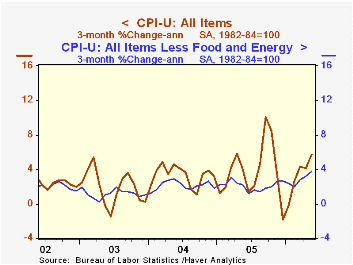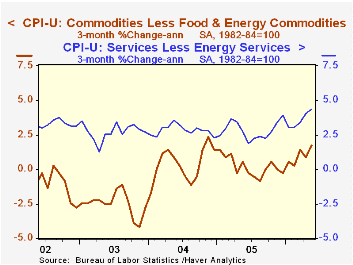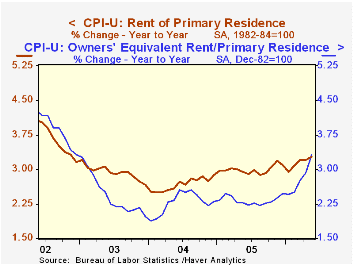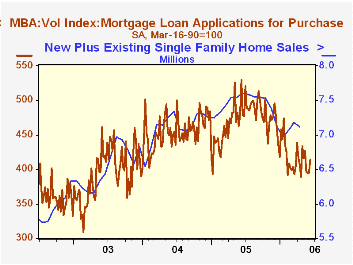 Global| Jun 14 2006
Global| Jun 14 2006CPI Rising More Quickly
by:Tom Moeller
|in:Economy in Brief
Summary
Consumer prices (CPI-U) rose 0.4% last month and matched Consensus expectations. The 0.3% rise in prices less food & energy, however, was firmer than expectations for a 0.2% gain. While slight, the upside surprise in the measure of [...]

Consumer prices (CPI-U) rose 0.4% last month and matched Consensus expectations. The 0.3% rise in prices less food & energy, however, was firmer than expectations for a 0.2% gain.
While slight, the upside surprise in the measure of "core" price inflation does indicate a renewed up trend in the rate of price increase.
Core goods prices rose 0.1% for the second month, but those two gains followed a 0.3% increase in March. Whether this is normal volatility (core goods prices declined 0.1% in February) or an uptrend emerging will be more evident with the release of the June price data.
Apparel prices rose 0.2% (0.0% y/y) in May following m/m gains of 0.6% and 1.0%. Household appliance prices rose 0.2% (1.3% y/y) and furniture prices rose 0.2% (0.4% y/y), the second m/m increase after three consecutive months of decline. New & used motor vehicle prices were unchanged (0.1% y/y) and tobacco prices fell 0.1% +3.9% y/y), the second consecutive down month. Medical care commodity prices rose 0.4% (4.3% y/y) for the fourth month in the last five.
Core services prices rose 0.4% during May, an uptick after three consecutive months of 0.3% increase. The acceleration was due to a 1.0% (5.1% y/y) jump in public transportation costs. Shelter prices also increased a more rapid 0.4% (3.3% y/y) after a 0.3% rise during April, an increase that very much reflected a 0.6% (3.3% y/y) jump in the rental equivalence measure of owners' primary residences. In addition, a 3.3% y/y gain in rents is an acceleration from the low of 2.5% in early 2004. Finally, education costs rose 0.5% (6.0% y/y) for the third consecutive month and medical care services prices rose 0.3% (4.1% y/y).
A 4.9% m/m jump in gasoline prices (33.3% y/y) caused energy prices to surge another 2.4% though in June gas prices have leveled at an average $2.90 per gallon. Natural gas & electricity prices fell 0.6% (+12.7% y/y), the fifth decline in the last six months.
Food prices rose 0.2%. Meat, fish & poultry prices fell 0.5% (-0.1% y/y).
The chained CPI, which adjusts for shifts in the mix of consumer purchases halved the prior month's increase and rose 0.3%. Less food & energy the increase in prices also decelerated to just 0.1%.
Borrowing by U.S. Households from the Federal Reserve Bank of Richmond is available here.
| Consumer Price Index | May | April | Y/Y | 2005 | 2004 | 2003 |
|---|---|---|---|---|---|---|
| Total | 0.4% | 0.6% | 4.1% | 3.4% | 2.7% | 2.3% |
| Total less Food & Energy | 0.3% | 0.3% | 2.4% | 2.2% | 1.8% | 1.5% |
| Goods less Food & Energy | 0.1% | 0.1% | 0.3% | 0.5% | -0.9% | -2.0% |
| Services less Energy | 0.4% | 0.3% | 3.3% | 2.8% | 2.8% | 2.9% |
| Energy | 2.4% | 3.9% | 23.3% | 16.9% | 10.8% | 12.2% |
| Food & Beverages | 0.2% | 0.0% | 1.9% | 2.4% | 3.4% | 2.1% |
| Chained CPI: Total (NSA) | 0.3% | 0.6% | 3.4% | 2.9% | 2.5% | 2.0% |
| Total less Food & Energy | 0.1% | 0.3% | 2.2% | 1.9% | 1.7% | 1.1% |
by Tom Moeller June 14, 2006

The total number of mortgage applications rose 7.0% last week and recovered most of the prior three weeks' declines. Nevertheless, applications in early June remained 1.4% below the May average which fell 2.2% from April.
Applications to refinance surged 10.6% following several weeks of decline. Therefore, refis in June were still 2.6% below the May average which fell 4.1% from April.
Purchase applications rose 4.8% following stability w/w the prior period. In early June purchase applications were 0.9% below the May average which fell 0.8% versus April.
During the last ten years there has been a negative 80% correlation between the interest rate level on 30-year financing and purchase applications while during those years there has been a 54% correlation between the y/y change in purchase applications and the change in new plus existing single family home sales.
The effective interest rate on a conventional 30-year mortgage was stable w/w at 6.83%. Rates began June about even with the May average of 6.86% but were up sharply from the 5.81% low last June. The rate on 15-year financing rose to 6.55% from 6.52% the prior week. Interest rates on 15 and 30 year mortgages are closely correlated (>90%) with the rate on 10 year Treasury securities and during the last ten years there has been a (negative) 82% correlation between purchase applications and the effective rate on a 30-Year mortgage.
The Mortgage Bankers Association surveys between 20 to 35 of the top lenders in the U.S. housing industry to derive its refinance, purchase and market indexes. The weekly survey accounts for more than 40% of all applications processed each week by mortgage lenders. Visit the Mortgage Bankers Association site here.
Alternative Mortgages from the Federal Reserve Bank of Boston can be found here.
| MBA Mortgage Applications (3/16/90=100) | 06/09/06 | 06/02/06 | Y/Y | 2005 | 2004 | 2003 |
|---|---|---|---|---|---|---|
| Total Market Index | 571.9 | 534.4 | -35.5% | 708.6 | 735.1 | 1,067.9 |
| Purchase | 414.6 | 395.6 | -21.7% | 470.9 | 454.5 | 395.1 |
| Refinancing | 1,499.4 | 1,356.0 | -49.5% | 2,092.3 | 2,366.8 | 4,981.8 |
Tom Moeller
AuthorMore in Author Profile »Prior to joining Haver Analytics in 2000, Mr. Moeller worked as the Economist at Chancellor Capital Management from 1985 to 1999. There, he developed comprehensive economic forecasts and interpreted economic data for equity and fixed income portfolio managers. Also at Chancellor, Mr. Moeller worked as an equity analyst and was responsible for researching and rating companies in the economically sensitive automobile and housing industries for investment in Chancellor’s equity portfolio. Prior to joining Chancellor, Mr. Moeller was an Economist at Citibank from 1979 to 1984. He also analyzed pricing behavior in the metals industry for the Council on Wage and Price Stability in Washington, D.C. In 1999, Mr. Moeller received the award for most accurate forecast from the Forecasters' Club of New York. From 1990 to 1992 he was President of the New York Association for Business Economists. Mr. Moeller earned an M.B.A. in Finance from Fordham University, where he graduated in 1987. He holds a Bachelor of Arts in Economics from George Washington University.
More Economy in Brief
 Global| Feb 05 2026
Global| Feb 05 2026Charts of the Week: Balanced Policy, Resilient Data and AI Narratives
by:Andrew Cates






